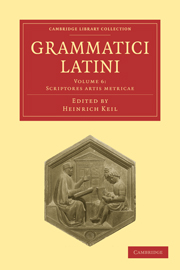Book contents
- Frontmatter
- PRAEFATIO
- INDEX LIBRORVM QVI HOC VOLVMINE CONTINENTVR
- MARII VICTORINI ARTIS GRAMMATICAE LIBRI IIII
- LIBER SECVNDVS DE PROTOTYPIS SPECIEBVS NOVEM
- LIBER TERTIVS DE CONIVNCTIS INTER SE ET MIXTIS METRIS PRAGMATICVS
- LIBER QVARTVS DE DE CONEXIS INTER SE ATQVE INCONEXIS QVAE GRAECI Α∑ϒΝΑΡΤΗΤΑ VOCANT PRAGMATICVS
- MAXIMI VICTORINI
- ARS VICTORINI GRAMMATICI
- ARS PALAEMONIS DE METRICA INSTITVTIONE
- MAXIMI VICTORINI DE RATIONE METRORVM COMMENTARIVS
- DE FINALIBVS METRORVM
- CAESII BASSI FRAGMENTVM DE METRIS ATILII FORTVNATIANI ARS
- ATILII FORTVNATIANI ARS
- [CAESII BASSI] DE METRIS HORATII
- BREVIATIO PEDVM
- TERENTIANI MAVRI DE LITTERIS DE SYLLABIS DE METRIS LIBRI TRES
- MARII PLOTII SACERDOTIS ARTIVM GRAMMATICARVM LIBRI TRES
- M. CLAVDII SACERDOTIS ARTIVM GRAMMATICARVM LIBER PRIMVS
- LIBER SECVNDVS
- LIBER TERTIVS MARII PLOTII SACERDOTIS DE METRIS
- RVFINI COMMENTARII DE METRIS COMICORVM ET DE NVMERIS ORATORVM
- COMMENTARIVM RVFINI V. C. GRAMMATICI ANTIOCHENSIS IN METRA TERENTIANA
- MALLI THEODORI LIBER DE METRIS
- FRAGMENTA ET EXCERPTA METRICA
- INDEX SCRIPTORVM
- INDEX RERVM ET VERBORVM
- CORRIGENDA ET ADDENDA
- LECTIONES CODICIS VATICANI 2725 IN EXCERPTIS MARII VICTORINI DE ORTHOGRAPHIA
ATILII FORTVNATIANI ARS
Published online by Cambridge University Press: 10 November 2010
- Frontmatter
- PRAEFATIO
- INDEX LIBRORVM QVI HOC VOLVMINE CONTINENTVR
- MARII VICTORINI ARTIS GRAMMATICAE LIBRI IIII
- LIBER SECVNDVS DE PROTOTYPIS SPECIEBVS NOVEM
- LIBER TERTIVS DE CONIVNCTIS INTER SE ET MIXTIS METRIS PRAGMATICVS
- LIBER QVARTVS DE DE CONEXIS INTER SE ATQVE INCONEXIS QVAE GRAECI Α∑ϒΝΑΡΤΗΤΑ VOCANT PRAGMATICVS
- MAXIMI VICTORINI
- ARS VICTORINI GRAMMATICI
- ARS PALAEMONIS DE METRICA INSTITVTIONE
- MAXIMI VICTORINI DE RATIONE METRORVM COMMENTARIVS
- DE FINALIBVS METRORVM
- CAESII BASSI FRAGMENTVM DE METRIS ATILII FORTVNATIANI ARS
- ATILII FORTVNATIANI ARS
- [CAESII BASSI] DE METRIS HORATII
- BREVIATIO PEDVM
- TERENTIANI MAVRI DE LITTERIS DE SYLLABIS DE METRIS LIBRI TRES
- MARII PLOTII SACERDOTIS ARTIVM GRAMMATICARVM LIBRI TRES
- M. CLAVDII SACERDOTIS ARTIVM GRAMMATICARVM LIBER PRIMVS
- LIBER SECVNDVS
- LIBER TERTIVS MARII PLOTII SACERDOTIS DE METRIS
- RVFINI COMMENTARII DE METRIS COMICORVM ET DE NVMERIS ORATORVM
- COMMENTARIVM RVFINI V. C. GRAMMATICI ANTIOCHENSIS IN METRA TERENTIANA
- MALLI THEODORI LIBER DE METRIS
- FRAGMENTA ET EXCERPTA METRICA
- INDEX SCRIPTORVM
- INDEX RERVM ET VERBORVM
- CORRIGENDA ET ADDENDA
- LECTIONES CODICIS VATICANI 2725 IN EXCERPTIS MARII VICTORINI DE ORTHOGRAPHIA
Summary
Etsi scio te omni studio atque virtute in hoc maxime laborare, ut oratorem te perfici velis, et hoc unum in animo volvere, quo avo et quo patre sis natus, dies noctesque insistere, ut eloquentia senatoriam cumuiles dignitatem (quid enim pulchrius disertissimo praetore? aut quid sublimius eloquentissimo consule?), tamen arbitror ab ilia virtutum omnium via aliquando in diverticula flectendum discendumque esse praeterea aliquid, pedetentim tamen et tantum, quantum oratorem et non valeat avocare et possit ornare. cogita enim te de omnibus bonis artibus iudicaturum et, quanto dignitate omnes homines anteieris, tanto scientia debere praestare. accipe igitur Horatiana metra, quae saepius flagitasti. nam quid refert hunc poetam imitari, tenere, diligere, si non omnes virtutes eius penitus cognoveris? quare necessario altius et ab ovo mihi, ∥ quod aiunt, repe|tenda res est, ut de metris ipsis principalibus ante percurram, quo magis haec quibus intendimus in aperto esse possint. sed, ut ille ait, carptim, ut quaeque memoria digna videhantur, de multis auctoribus excerpta perscripsi. quod si onmia velis cognoscere et nomina et genera metrorum, cum tibi ab oratoria otium fuerit, veteres lege musicos, id est, nt ait Lucilius, archetypos, unde haec sunt omnia nata.
DE LITTERIS VOCALIBVS
Igitur ut a certo initio auspicemur, de litteris vocalibus pauca dicam, simul ne onerare te videar, cum artem grammaticam et intellexeris apud me et memoriae mandaveris diligenter, praesertim cum satis meminerim me tibi omnem summam metrorum brevitate pollicitum. ergo omissis omnibus quae iam nosti admonendus es vocales nostras dichronas esse, hoc est et produci et corripi.
- Type
- Chapter
- Information
- Grammatici Latini , pp. 278 - 304Publisher: Cambridge University PressPrint publication year: 2009First published in: 1874



